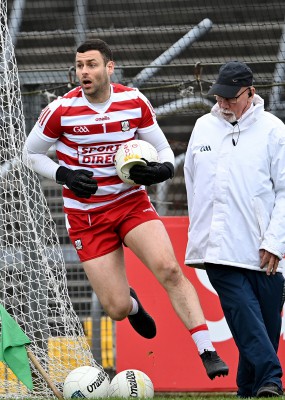By Patrick Morrison
“THIS compass does not point North… It points to the thing you want most in this world.” – Captain Jack Sparrow
This is a quote from Hollywood blockbuster movie ‘Pirates of the Caribbean,’ starring Johnny Depp as the flamboyant and estranged pirate Captain Jack Sparrow. The film follows the serendipitous antihero as he bumbles his way about reaching his intended goals.
In his possession is a compass. A compass that, to the unknowing eye, seems to be broken as it does not point North as any compass should. Instead, the navigational device points to something far more important. As Jack tells us, it points to ‘the thing you want most in this world.’
The human body is a magnificent piece of divine ingenuity. Some of the feats that can be performed by humans across the planet are simply indescribable. It just so happens that our bodies come equipped with a similar compass to the one in which Captain Jack possesses.
This internal compass has a number of different functions, but it is also one that can focus on the things which are most important to us, while also filtering out those things which are not. It is this same compass that kicks in whenever you buy a new car, like a Volvo, and you then start to see Volvos everywhere. Are there more Volvos on the road? No. They were always there; your internal compass is now focusing on Volvos and so actively seeks them out.
The name of this internal compass is the Reticular Activating System (RAS) and is a bundle of nerves housed within our brainstems. It has both ascending and descending pathways that play crucial roles in arousal and consciousness. The main functions of the Reticular Activating System are somatic motor control, cardiovascular control, pain modulation, sleep, consciousness, and habituation.
It is the last function, Habituation, which I will be focusing on for the remainder of this article. It is in this process that our brains learn to disregard stimuli that is repetitive and/or meaningless while also remaining sensitive and open to receiving others. An example of this would be how I was able to live at the foot of the Cathedral in Armagh and sleep at night through the ringing bells that would ring during the night. But if I heard the smoke alarm, I would awaken straight away.
How does this apply to goalkeeping you ask?
Well, if you think of the games you have played in, especially ones that have had a large crowd in attendance, it is your RAS that allows you to block out the unnecessary crowd noise and focus on the voices of your teammates whenever you are in the thick of the action.
As well as this, it also aims to work in your favour by operating in tandem with your ability and your experience to help look for game stimuli that you need to perform effectively i.e. – runners for restarts or kick-outs, unmarked players inside your defence, late runners, and/or attackers shooting for goal.
There are ways in which you can train your RAS to assist you as effectively as possible. It has been suggested that this can be done by merging your conscious thoughts with your unconscious thoughts. By doing this your RAS uses what you focus on as a filter to look for that specific stimuli, sifting through all data and then only brings the important cues to your attention. It does all this without you being aware that it is happening while also programming itself without you having to do anything.
Here are a few suggestions for programing your Reticular Activating System:
Having a set of goalkeeping principles that define your own unique goalkeeping style is the perfect way to program your RAS into the way you wish to play as a goalkeeper. By specifically outlining how you wish to perform, your RAS will then know what to look for whenever you are in competitive action.
Both pre-game and post-game visualisation will have a programing effect on your RAS. Just like having a set of principles, visualising how you want to play in a game and visualising how you played after a game connects into your RAS. This again allows this system to calibrate and recalibrate as required.
Completing some extensive opposition analysis while learning as much as possible about opposition teams both collectively and individually, helps your RAS install oppositional cues to look for during games. I.e. – attackers’ preferred shooting foot, offensive formations, double acts etc.
Creating performance signals gives your RAS direct activation cues when in game. In training be sure to practice as many game-related situations as possible and ensure that you establish options for each situation. By installing a cue for each option your RAS will automatically feed into your performance allowing you to make decisions with minimal conscious thought.
Create cues for your defence to respond to. This is done by creating a team language or at the very least a goalkeeper language for your defenders to act upon. Once you have determined your cue words and their meanings then teach them religiously to the defenders. It is essential that they know what they mean, and the actions required when called. And remember, non-starters need to know just as much as starters.
Most importantly, INK IT, DON’T THINK IT! Everything you do to improve your RAS system needs to be written down. Ideally into a diary or journal just like your training sessions and games.
By writing it down you are embedding it further into your RAS allowing it to further recalibrate itself to your advantage. It also allows you to visit and revisit it regularly because the more you visit all of the above the more your RAS will work to improve your performance.
If we take a compass pointing North as a representation of our end goal, then Captain Jack Sparrow’s compass, that points to the thing you want most, is a representation of what it takes to reach that end goal. It’s all well and good knowing where it is you want to get to, but it becomes meaningless if you do not know how to get there. For this reason, it is crucial that you ‘Know What You Want!’Email: pmgoalkeeping@hotmail.com; Facebook: @MSoG11Twitter: @MorSchGk
Receive quality journalism wherever you are, on any device. Keep up to date from the comfort of your own home with a digital subscription.
Any time | Any place | Anywhere














